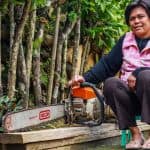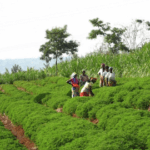Different Disasters, Same Solution? Applying New Orleans’ Post-Hurricane Model to Revive Detroit’s Neighborhoods
After Hurricane Katrina, New Orleans was left with a devastated physical infrastructure, compromised public services and a resident population reduced to approximately 50 percent of the city’s peak. Not quite as stormy, Detroit also gradually experienced a blow of its own. Following decades of economic stagnation, Detroit was left with a crumbling foundation, decaying municipal ecosystem, and a wave of foreclosures and relocations that resulted in a significant drop in density. Two entirely different disasters with the same ramifications.
The cities’ similar challenges called for similar solutions. That’s why Develop Detroit, a mission-based real estate development company, looked to New Orleans for inspiration. Our organization is modeled after the Gulf Coast Housing Partnership (GCHP), established in the aftermath of Katrina by our mutual sponsor, the Housing Partnership Network (HPN), a social enterprise incubator and nonprofit venture capital firm that has created over a dozen housing-related social enterprises since 1999. The first stages of our citywide revitalization planning process mirrored GCHP’s early efforts to mobilize New Orleans’ local leadership – citizens, civic leaders and private players – behind a reimagining of the city. This vision relied heavily upon an insertion of capital and strategic partnerships by institutions like JPMorgan Chase, Ford Foundation and the Kresge Foundation, in addition to a high-capacity, nonprofit developer dedicated to rebuilding the urban fabric of distressed neighborhoods. Both sides also recognized the importance of leaning on the expertise, skills and talents of Detroiters who have persevered through the economic downturn.
Our mission, put simply, is to “build vibrant, resilient communities and expand opportunities for all residents to succeed.” In order to accomplish this objective, we focus on the stabilization of Detroit’s neighborhoods to both advance and balance existing citywide efforts, centered on placemaking strategies designed to attract a critical mass of residents to target neighborhoods and stimulate the market. To this end, Develop Detroit has concentrated on select communities and alignment with key development partners. We believe that a robust, inclusive development model encourages the layering of collective resources and programs that will ultimately lead to the growth of stable, economically diverse communities. It is precisely why we’ve focused our investments on preserving existing affordable housing in areas that are experiencing rapid rent escalation, and on creating equitable developments while catalyzing further investment into the neighborhoods. All Detroiters, regardless of race, gender, profession or educational attainment level should participate in the city’s resurgence. We firmly believe that.
Specifically, to transform neighborhoods, Develop Detroit works to address the preponderance of vacant land and blighted properties pulling down residential blocks. We also drive the development of higher density, quality multifamily rental housing that supports commercial investment, to create sustainable, mixed-income neighborhoods with plentiful amenities. Detroit is not alone in this regard – depressed neighborhood markets throughout the country have seen similar efforts undertaken, many of them under the leadership of HPN member organizations. The most successful of these have involved sustained real estate interventions coupled with a deliberate plan to achieve density, diversity and quality in the residential environment, while increasing service and commercial infrastructure.
Single-Family Development
Develop Detroit expects to close on a $5 million New Market Tax Credit (NMTC) allocation in the first quarter of 2018 that will enable our organization to execute a catalytic single-family development platform in the North End neighborhood (about three miles north of the core business district and blocks away from the terminus of the new QLine rail) and historical Grandmont-Rosedale neighborhood. We are planning to leverage the NMTC and additional funding into a single-family initiative that will bring close to 40 newly constructed homes to the community alongside 30 renovated houses. This project will accelerate the transformation of the North End through block-by-block development; reducing blight, increasing pride and ownership in the community, and building the foundational pieces for additional investment into the neighborhood. Our goal is to then deploy this same model into other neighborhoods, working with the local nonprofits who have served those areas for decades to expand capacities, achieving the scale of impact that is necessary for true community revitalization.
Multifamily Developments
Another prong to our approach is multifamily development, and that plays out both in new construction projects and the preservation of existing buildings that include affordable units (units that have a rent restriction in accordance to an individual’s income). Our Sugar Hill Arts District development (pictured above) is a new construction mixed-use, mixed-income development with 84 residential units (we anticipate that 25 percent of these units will be rent-restricted), 7,000 square feet of commercial space and over 300 parking spots. With the area’s rich connection to the arts, our organization is committed to implementing the essence of the district’s history into every element of the development process, including marketing and community engagement efforts. The design team – which includes local architecture firm McIntosh Poris Associates and the renowned Phil Freelon of Perkins+Will (architect of the National Museum of African American History and Culture in Washington, D.C.) – is partnering with Develop Detroit to execute our equitable development approach.
Nearly a mile north of Sugar Hill, we own and operate two multifamily buildings: Midtown Square (a 73-unit Low-Income Housing Tax Credit property) and Marwood Apartments (a 53-unit naturally occurring affordable housing community). Both properties are located in the North End neighborhood and serve as anchor properties to our subsequent multifamily and single-family investments in the area. Renovations to the Marwood Apartments are scheduled to begin in 2018 along with new construction on an adjacent 20-unit mixed-use building.
Rounding out our current multifamily portfolio is University Meadows, an affordable senior housing community in a burgeoning area experiencing the effects of market speculation – many opportunistic investors hoping to make a significant return have purchased and held land and properties, asking for exorbitant sales prices. Detroit has a rapidly aging population (much of which is low-income), and as such, our organization has been extremely committed to finding opportunities to stop the displacement of seniors and work on developments that allow the population to age in a service-rich, high-quality environment. Bearing this strategy out, the University Meadows project will include the preservation of 53 affordable units, the renovation of community spaces and residences, and the addition of rain gardens, energy efficient solutions such as solar panels, a weekly pop-up market and many other features. Our community engagement strategy relative to this property has already started to influence many of the residents’ feelings toward the property, the city, and their quality of life.
“In the past, I’ve been dissatisfied with this building and felt like Detroit didn’t care about older people, but everybody here has hope that things will be a lot better now,” said Debra Cheeks-Moss, a longtime resident. “You’re showing that you really care.”
Expanding Develop Detroit’s Impact
Over the past two years, Develop Detroit has been both responsive and proactive in helping to rebuild the urban fabric required for strong neighborhoods in a scaled and dynamic way. As our organization has cultivated a better understanding of the landscape and the needs of our target communities, we’ve begun to aggressively pursue growth strategies that will help enhance our impact on the city and its residents. These include recruiting talented team members to execute significant and nuanced real estate projects, building more relationships with potential development partners, and the launch of a neighborhood fund that provides investors an opportunity to make a meaningful difference in the lives of Detroiters.
Just as New Orleans has shown amazing resilience in recovering from Katrina’s devastation, it’s increasingly clear that Detroit is on a similar trajectory. We’re looking forward to continuing to contribute to its ongoing revitalization.
Sean White is director of fund development for Detroit-based Develop Detroit.
- Categories
- Investing



